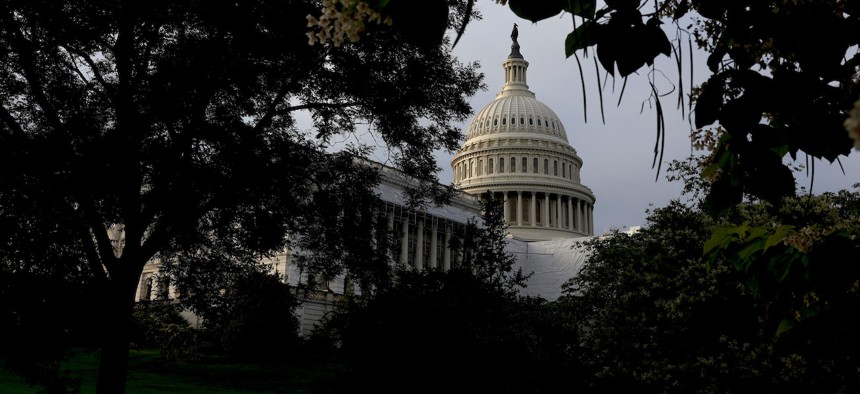
The Separation of Powers Restoration Act (H.R. 288) would allow federal courts to review all aspects of a law’s implementation without deferring to a federal agency’s interpretation of what the statute allows it to do. Anna Moneymaker/Getty Images
House Votes to Give Agencies Less Leeway in Interpreting Laws
The bill would kill a nearly 40-year Supreme Court precedent.
The House on Thursday passed a measure to severely restrict federal agencies’ authorities, approving nearly along party lines a revocation of a longstanding judicial precedent that afforded the executive branch added leeway in interpreting laws.
The Separation of Powers Restoration Act (H.R. 288) would allow federal courts to review all aspects of a law’s implementation without deferring to a federal agency’s interpretation of what the statute allows it to do. That Supreme Court established that precedent, known as Chevron deference, in 1984 and federal courts have since leaned on it in thousands of cases when determining whether agency actions were lawful.
Republicans have repeatedly said Chevron gives too much power to “unelected bureaucrats” to fill in the gray areas of federal statutes and provides excessive latitude for the executive branch to implement rules and regulations. Years of legal precedent, meanwhile, have found that Congress lacks the expertise required to enact laws with certain specificity and therefore intentionally allows agencies some space to interpret the laws it passes. One Democrat, Rep. Henry Cuellar, Texas, joined all-but-one Republican, Rep. Matt Gaetz, Fla., in approving the bill.
The Supreme Court last month agreed to take up a case seeking to upend Chevron, causing defenders of the precedent to worry the court’s more conservative makeup will overturn it. The case, Loper Bright Enterprises v. Raimondo, involves whether the National Marine Fisheries Service, part of the National Oceanic and Atmospheric Administration within the Commerce Department, can require the fishing industry to pay for the inspectors who monitor fisheries.
Many legal scholars and consumer advocates have warned overturning Chevron would neuter agencies by subjecting them to significantly more judicial second guessing. Lawmakers would be forced to write laws with significant more detail or risk leaving agencies unable to enforce them. Opponents of Chevron have said the judicial branch should be able to rule on cases with impartiality, rather than being forced to accept federal agencies' interpretations so long as they are considered reasonable.
“Increasing the power of the administrative state further removes and insulates policymakers from electoral accountability because, unlike Congress and the president, federal agencies are not directly accountable to the people,” Republicans said in a report on the bill.
The Supreme Court last year established the “major questions doctrine,” which set a precedent providing federal agencies little flexibility to create new regulations with major economic or political significance that rely on authorities not clearly laid out in law. The court is expected to hear arguments on Loper this fall.
While the House narrowly approved the bill, an end to Chevron would likely have to come from the Supreme Court. The Senate is unlikely to take up the bill and the White House has threatened a veto. A reversal would undermine agency interpretations of laws that have "promoted economic growth, clean air and water, safe and healthy food, civil rights, public safety, crime reduction, wage increases, lowering costs, and safe working conditions," the White House said. Industries would be left with less predictable outcomes and political accountability would be stripped away.
The bill would "fail to respect the expertise agencies can bring to bear in administering complex statutory schemes," the White House said.
On Wednesday, the House passed the Regulations in Need of Security (REINS) Act, which would also hamstring agencies by requiring all major rules and regulations to first receive approval in Congress.







